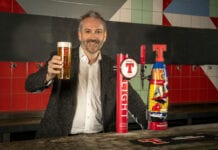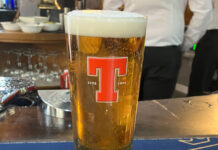Customers now expect features such as wi-fi and contactless payment in venues

AS technology has progressed and become such an ordinary and indispensable part of our everyday lives, it is no longer something that can be considered a luxury in the licensed trade.
Customers in 2017 increasingly expect services such as wi-fi, online booking, mobile ordering and contactless payment as standard in venues.
What was once exceptional has become commonplace.
It’s clear that technology is changing consumer behaviour and operators need to be equipped.
Paul Crawford, sales director at wi-fi provider Kiltr, said technology in the hospitality industry “continues to accelerate at a great pace and new technologies are helping both operators and [drinks] brands streamline their businesses”.
“Technology will be used more and more commonly to make life easier for operators,” said Crawford.
Clive Consterdine, sales and marketing director at EPOS specialist Zonal, agreed.
He said technology now “sits at the very heart of the day to day operations of any business”.
“In the past it could be argued that investing in technology came second to investing in the fabric of a hospitality business, now the two go hand in hand,” said Consterdine.
“Operators that have not had a clear technology strategy in the past are likely to have made expensive mistakes.”
There are hard numbers to support this.
Operators can now learn more about customers’ behaviour than ever before.
Quoting the GO Technology report, which was compiled by Zonal and research firm CGA, Consterdine said use of mobile devices to pay for food and drink has increased from 2.4 million consumers to 3.1 million in under two years – with the trend set to continue.
“It’s clear that technology is changing consumer behaviour and operators need to be fully equipped to meet that demand, by investing in integrated payment solutions, that facilitate a smoother process for time poor customers who demand a faster finish,” said Consterdine.
While adopting technology that allows people to order or pay for food using their phones can make things more convenient for customers, it’s the benefits to business owners that really make this technology important to the licensed trade.
Julie Hossan, marketing specialist at technology supplier Posera, pointed to mobile ordering systems as an example of technology that is helping licensed venues to improve the operation of their businesses.
“This is a huge technological innovation in the hospitality industry, having the ability to remotely place orders at the tables, which automatically sends the order to bar and kitchen printers, improves efficiency on the floor,” said Hossan.
And while each type of technology can provide its own benefits, and insights into customer likes and dislikes, the real business benefits come from integrating various systems together.
“With the correct system investment in EPOS, it can offer the licensees complete control of their daily operations both from a front of house and back of house perspective,” said Hossan.
“Operations will have KPI (key performance indicator) reporting information at the touch of a button to help analyse business statistics.”
The benefits of integrated technology systems were also extolled by Consterdine at Zonal, who said that by drawing data from throughout a customer’s visit, bar and pub operators can “learn more about your customers, their behaviour and purchasing preferences than ever before”.
“With the latest evidence from CGA suggesting that the eating and drinking out sector may be starting to show signs of reaching saturation point, with the number of food-led outlets having declined 0.4% in the last 12 months and drink-led 2.1%, it’s never been more important to understand your customers and create bespoke campaigns that will resonate with them,” said Consterdine.
The right investment can offer licensees complete control of their daily operations.
Technology that delivers equal benefits to customers and operators is likely to continue to be the trend in the years ahead, according to Consterdine.
He pointed to innovations such as venue-specific apps as an example of how advancing technology will continue to benefit the trade.
“However, brands must ask themselves what will make their app truly valuable to customers,” he said.
“Will it offer benefits that are not available elsewhere, like the convenience of order and pay at table, or unique loyalty perks? Today’s mobile users will quickly delete an app that they don’t see delivering value, so it’s a case of survival of the fittest.”























